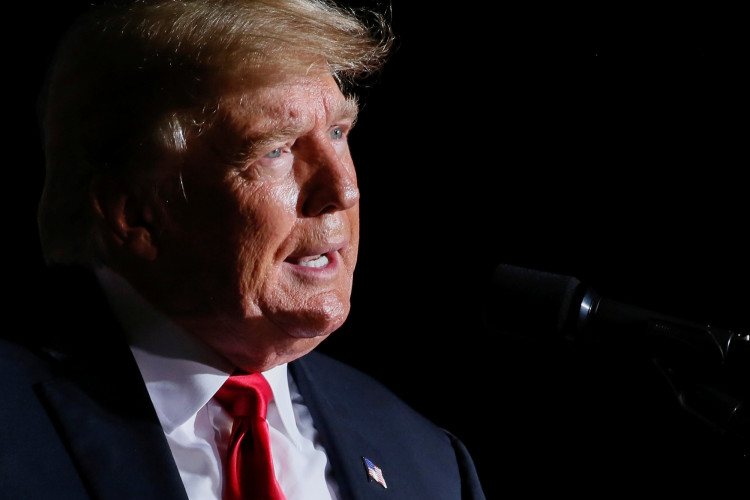Former President Donald Trump's campaign is facing mounting backlash following a controversial rally held at Madison Square Garden on Sunday. The event, intended to energize Trump's base ahead of the 2024 presidential election, has instead sparked outrage over offensive remarks made by speakers, including comedian Tony Hinchcliffe, whose comments about Puerto Rico drew widespread condemnation.
Hinchcliffe opened the event with a string of vulgar jokes, including a reference to Puerto Rico as a "floating island of garbage," which immediately drew backlash from both Republicans and Democrats. Sen. Rick Scott (R-Fla.), whose state is home to a large Puerto Rican population, was quick to condemn the remarks, calling them "neither funny nor true." Rep. Anthony D'Esposito (R-N.Y.), a Puerto Rican facing a tough reelection battle, took to social media, criticizing the comedian's routine, saying, "The only thing that's 'garbage' was a bad comedy set."
The timing of the remarks has sparked concerns among Republican strategists, who worry that the rally could alienate Puerto Rican voters in key battleground states such as Pennsylvania and Florida. With approximately 500,000 Puerto Ricans living in Pennsylvania alone, the potential fallout from Hinchcliffe's comments could have significant political consequences. "I'm livid," one source close to the former president told CNN, expressing frustration that the event's speakers were not properly vetted before taking the stage.
Throughout the rally, several speakers made additional offensive comments, targeting Latino and Black Americans as well as women. These remarks, some of which appeared to be read from teleprompters, were not all impromptu, leading to internal disputes within Trump's campaign over who approved the content. One adviser insisted that the more egregious comments were ad-libbed, while others admitted that the speeches were not scrutinized as thoroughly as they had been during the Republican National Convention earlier this year.
By Monday, the fallout within the campaign was apparent. Tensions were high as Trump advisers struggled to control the narrative and distance themselves from the remarks. In a swift move, the campaign released a statement disavowing Hinchcliffe's comments about Puerto Rico. "This joke does not reflect the views of President Trump or the campaign," spokesperson Danielle Alvarez said, attempting to contain the damage.
However, the campaign's response did little to quell the outrage. Rep. Alexandria Ocasio-Cortez (D-N.Y.), who is of Puerto Rican heritage, described the event as a "hate rally," and suggested that the comments reflected Trump's true feelings. "They're just realizing that they might have made a big error by saying out loud what they're thinking," she said during an interview with MSNBC.
For Trump, the timing of the controversy could not be worse. With just days left before the election, his campaign had been attempting to present a more disciplined message. A new advertisement released earlier on Sunday had positioned Trump as a strong leader capable of returning the country to prosperity. Republican strategist Scott Jennings praised the ad as a "perfect closing argument" for Trump's campaign, but by the evening, the message was lost in the uproar.
Puerto Rican voters have become increasingly influential in recent election cycles, particularly in Florida and Pennsylvania. In 2020, Democrats targeted Puerto Rican voters by highlighting Trump's handling of the aftermath of Hurricane Maria, during which the former president accused local officials of inflating the death toll. Despite those efforts, Trump performed better than expected among Puerto Ricans in Florida, improving his margin by seven points in Osceola County, a Democratic stronghold.
This time around, Democrats are seizing on the controversy at the Madison Square Garden rally to mobilize Puerto Rican voters. Music superstar Bad Bunny, who has over 45 million followers on social media, signaled his support for Vice President Kamala Harris in the wake of Hinchcliffe's comments. Harris' campaign has been quick to capitalize on the endorsement, promoting it as a key moment in their efforts to reach Latino voters.
Trump, who has long relied on inflammatory rhetoric to energize his base, now faces the challenge of appealing to a broader electorate while controlling the divisive elements of his campaign. His team has denied any connection between Hinchcliffe's remarks and the broader strategy, but the damage may already be done. Puerto Rican voters are a crucial demographic in battleground states, and any erosion of support could have serious consequences for Trump's chances in the election.
Despite the growing criticism, Trump has not personally addressed the remarks. As of Monday, there were no plans for him to discuss the controversy at his upcoming events in Georgia and Pennsylvania, leaving his campaign to manage the fallout. Allies of Trump are increasingly concerned that these inflammatory moments could overshadow his broader message in the final days of the campaign.






